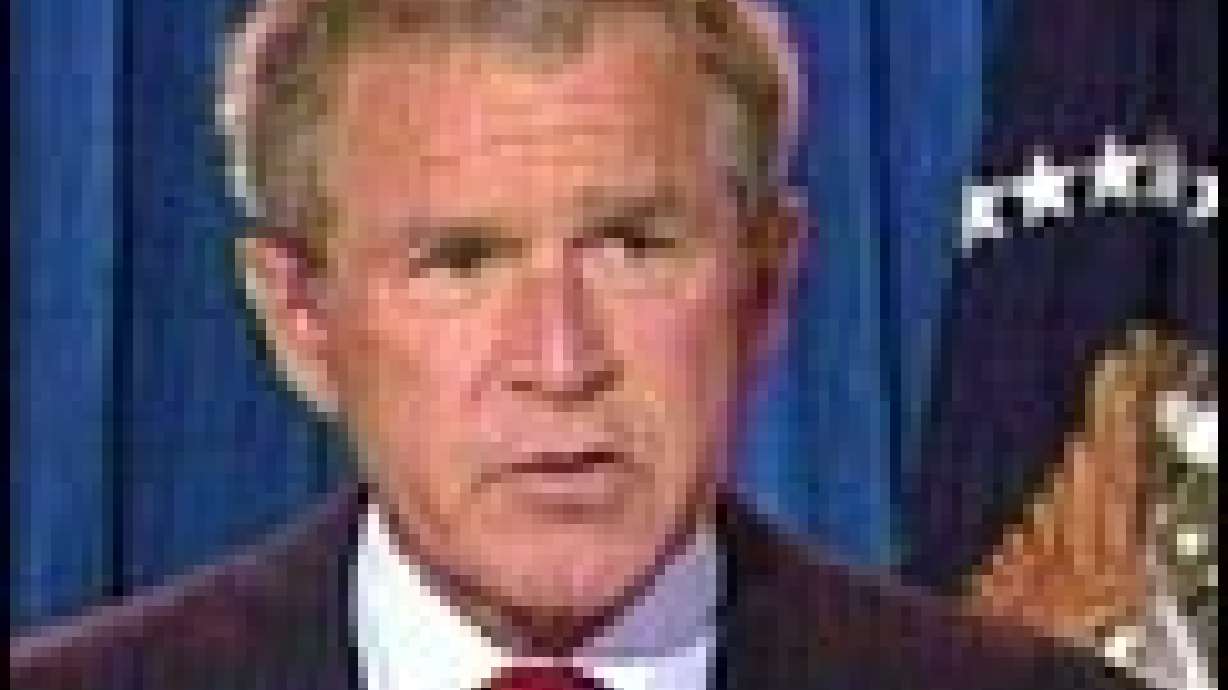Estimated read time: 3-4 minutes
This archived news story is available only for your personal, non-commercial use. Information in the story may be outdated or superseded by additional information. Reading or replaying the story in its archived form does not constitute a republication of the story.
WASHINGTON (AP) -- Saddam Hussein deserves the "ultimate penalty" for his crimes, President Bush said Tuesday, putting the United States sharply at odds with Europe and the United Nations which adamantly oppose the death penalty.
A day after saying his own views about Saddam's fate were unimportant, Bush decided to step forward and publicly state his opinion, a position that could carry considerable influence in determining the punishment of the deposed Iraqi leader. The administration blames him for killing 300,000 people.
"Let's just see what penalty he gets, but I think he ought to receive the ultimate penalty ... for what he has done to his people," Bush said. "I mean, he is a torturer, a murderer, they had rape rooms. This is a disgusting tyrant who deserves justice, the ultimate justice."
Bush made his comments in an interview with ABC News' Diane Sawyer, and the network released a transcript of the remarks.
Even while expressing his views, Bush said Saddam's punishment "will be decided not by the president of the United States but by the citizens of Iraq in one form or another."
He said he doesn't see a need for an American role in Saddam's trial, a process that Iraqis are "plenty capable of conducting."
The president distanced himself from possible interrogation methods used to elicit information from Saddam, other than to say that "this country doesn't torture."
Bush also defended the intelligence that he used in citing weapons of mass destruction in Iraq as a main reason for going to war. Asked about the emphasis now on alleged weapons "programs" instead on possession of weapons themselves, Bush remained firm about his prewar assessment of the threat Saddam posed and insisted the world and America are safer because of the war that toppled him.
"What's the difference?" he said. "If he were to acquire weapons, he would be the danger. That's what I'm trying to explain to you. A gathering threat, after 9-11, is a threat that needed to be dealt with."
Bush has long been a proponent of capital punishment. During his six years as governor of Texas, 152 convicts were put to death.
In the case of Saddam, the death penalty issue could cause friction between the United States and Europe. All 15 member nations of the European Union have abolished capital punishment, and they often encourage other countries -- most notably the United States -- to abolish it.
But it is unclear how strenuously they would object to a death sentence for Saddam.
Britain's top representative in Iraq, Sir Jeremy Greenstock, said his country would not participate in a tribunal or legal process that could lead to execution. U.N. Secretary-General Kofi Annan also has said the world body would not support bringing Saddam before a tribunal that might sentence him to death.
British Prime Minister Tony Blair's spokesman said that although Britain opposes the death penalty, it would have to accept an Iraqi decision to execute.
Members of the U.S.-appointed Iraq Governing Council have predicted a quick trial and a quick execution for Saddam. The U.S. occupation authority suspended using the death penalty, and Iraqi officials have said they will decide whether to reinstate it when a transitional government assumes sovereignty, scheduled on July 1.
The Vatican's Cardinal Renato Martino stressed the Roman Catholic Church's longtime opposition to capital punishment.
He said he felt "compassion" for Saddam, despite his crimes, after seeing images of "this destroyed man" being "treated like a cow, having his teeth checked" by an American military medic.
Russian Deputy Foreign Minister Yuri Fedotov, whose country opposed the war, said only Iraqis could decide Saddam's fate.
Diego Ojeda, EU spokesman on external relations, wouldn't comment specifically on Saddam, but said, "We believe there are no circumstances that can justify the death penalty."
Danish Prime Minister Anders Fogh Rasmussen, who supported the U.S.-led war, also emphasized his country's opposition to the death penalty.
But Australia's Prime Minister John Howard, who sent troops to fight in Iraq, said he would support the death penalty for Iraq. "If it were imposed, absolutely," he said.
(Copyright 2003 by The Associated Press. All Rights Reserved.)








